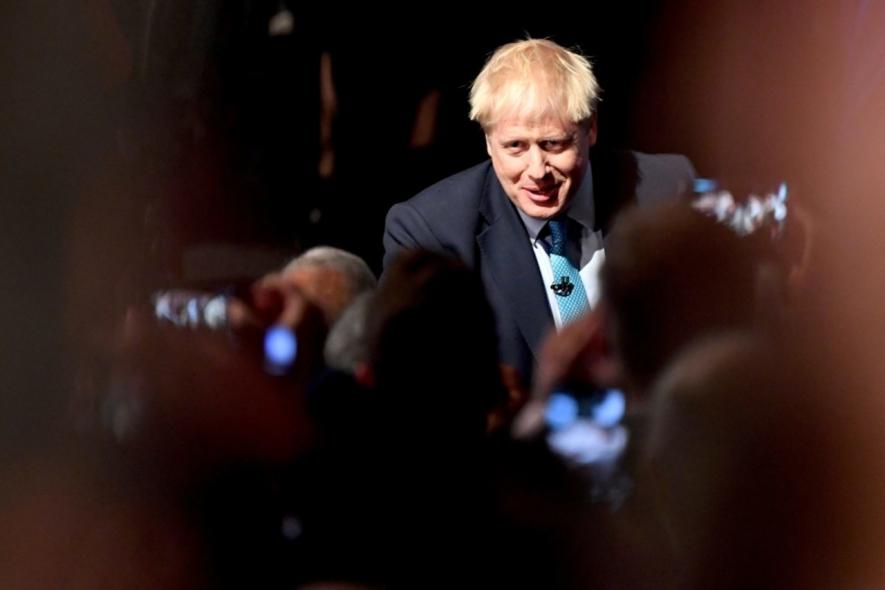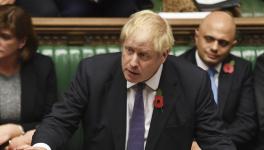Boris Johnson’s Brexit Deal is Neoliberalism on Steroids

The Brexit deal proposals by prime minister Johnson, that are are not “even remotely acceptable” to the EU leadership, have also been criticized as “unrealistic” by the opposition within the UK. (Photo: AFP)
The Boris Johnson government is negotiating with the leaders of the European Union (EU) after it released its plan for a Brexit deal on October 2. The plan seeks a complete exit from the EU, from both the Customs Union and Common Market, by the scheduled date of October 31. The plan also proposes a period of transition for Northern Ireland as passed by the Northern Ireland Assembly.
With several major changes from the previous deal which cost former prime minister Theresa May her job, the plan seems to have rearranged political alliances inside the House of Commons.
Labor Party leader Jeremy Corbyn has called the Johnson government’s plan a “race to the bottom.” However, many of the recently expelled rebel Conservative MPs have reacted positively to the government’s plan, as have the Northern Irish unionists who had opposed May’s deal even while supporting the minority Conservative government. So what is in store for the UK if this new deal goes through?
How does Johnson’s plan deal with the Irish border?
The biggest obstacle in the Brexit process has been the question of Northern Ireland. The government has proposed special transitional provisions for Northern Ireland, unlike the rest of the country. The plan seeks to effectively create a buffer regulatory zone in Northern Ireland, between Great Britain and the EU, to avoid a hard border between the two.
The regional devolved government of Northern Ireland will be given the option to either leave the EU along with the rest of the UK, or go for a four-year transitional period, subject to an extension with parliamentary consent. During this period, Northern Ireland will be part of the EU Common Market for agricultural and food products and manufactured goods, but will leave the Customs Union.
Therefore, during this period, Northern Ireland will follow EU quality standards and allow the free flow of goods into its territory by land. At the same time, it will be de-linked, like the rest of the UK, from regulations on labor, taxes and the environment that are enforced by Brussels. Under the plan, Northern Ireland will have significant autonomy and nearly unilateral control over how it does business with the EU.
How is the current proposal different from May’s “backstop”?
There are significant differences between Johnson’s deal and the earlier proposed solution of the Irish “backstop” regarding the transition period, beginning with the fact that the power and responsibility to formalize and (dis)continue the arrangement with the EU shall rest entirely with Stormont, the seat of the Northern Irish government, and not Westminster or Brussels.
The transition would be a time-bound process, with the primary intent being the formulation of mechanisms to implement British customs and trade regulations, without a physical hard border with Ireland.
However, while the transition is time-bound, it increases the economic and political uncertainties in Northern Ireland. May’s plan included more concrete steps to wean Belfast away from the Customs Union, even while it was not bound by time. Comparatively, Johnson, who has asserted several times that he will not add any extra border infrastructure for customs and emigration checks, has no clear plan apart from vague suggestions of having “high-tech borders,” when in some eventuality Northern Ireland leaves the EU Common Market.
The other catch is that Northern Ireland is often faced by governmental instability due to the consociationalist arrangement of the executive in an extremely polarized and divided political landscape. For instance, currently, the executive has been in suspension since January 2017 because of a hung legislature and no reconciliation between the Unionist and Nationalist camps.
The uncertainties in the Johnson deal will only add volatility to the tenuous peace in the region, which has been maintained for nearly two decades by the open border, the Good Friday Agreement, and the common membership of Ireland and the UK in the European Union.
How will this affect labor rights and corporate tax regime?
Johnson’s deal has several notable omissions, with issues such as trade regulations, labor rights, quality standards, environmental regulations, and even matters like migration and refugee protection receiving little to no mention.
It must be noted that May’s government also gave no clear outlines on the status of workers’ rights that were hitherto protected by EU labor codes and regulations. However, her erstwhile plan did include promises of continuing the protective measures. The Johnson government, on the other hand, has made no such promises.
As the UK leaves the jurisdiction of the EU Court of Justice, there will be no means to enforce any of these regulations that originated in the EU and not the British legal system. Paid leave, maternity and paternity benefits, equal rights for temporary workers, and several aspects of health and safety in the workplace are some of the key areas of workers’ rights which are derived largely, if not entirely, from EU laws.
Currently, corporate taxes in the UK are governed by common directives that are arrived at by the member nations of the EU through a consensus. This means that no member state can unilaterally alter its tax regime and go against the common directives which are binding.
Post-Brexit, the government will be free to change the tax laws at will. The prime minister has already hinted at this possibility. In September, Johnson claimed that his government has proposed “the most competitive tax rates” in the western hemisphere. Radical tax reforms that drive down corporate tax rates and do away with several regulations governing tax evasion seem to be in the offing.
How is the EU reacting?
Johnson’s deal is unlikely to impress the European leadership. The EU president, Donald Tusk, has categorically stated that the leadership is not convinced with the deal even though they are “open” to negotiate. Even the Brexit committee in the European Parliament has proclaimed that the plan is not “even remotely acceptable”.
The decision to accept or reject Johnson’s Brexit proposal will be taken by the European Council, the de facto executive arm of the EU, where the veto of even a single nation can kill the deal. Within the EU, the biggest critic of this plan at the moment is the Irish prime minister Leo Varadkar who is concerned about the border with Northern Ireland once the transition period is up.
Varadkar finds Johnson’s assurances that there will not be any new infrastructure built at the Irish border, or that customs check will be done “away from the border,” dubious. This is primarily because in case Northern Ireland ceases to be the regulatory buffer zone, or a situation arises for a no-deal Brexit, Ireland will very likely have to take upon itself the task of undertaking customs and emigration checks, for the passage of goods and people through its border into the UK.
Varadkar is also concerned about giving unilateral power, or what he calls “veto” powers, to Northern Ireland over the arrangement, especially since governments there have a history of being unstable, along with the presence of a strong Unionist tendency.
What next for Britain?
The opposition parties have already begun their offensive against Johnson’s proposals. Labour’s Jeremy Corbyn has asked his fellow legislators to vote against the deal. He attacked the deal as an attempt to do away with workers’ rights, diminishing the progressive safeguards for workers secured by Britain through membership of the EU. Responding to the deal in the House of Commons, he added that “the proposals are damaging and unrealistic”, and will only “destroy” the economy of the UK and the Good Friday Agreement.
Labour has recently accepted Corbyn’s plan to hold a second referendum with a “credible” Brexit deal, along with an option to remain in the EU to be held after a general election. The party is also planning to work with other opposition parties and even rebel government MPs to pass a vote of no-confidence against the Johnson government and form a new transitional one to push forth the plan for a second vote on Brexit.
Leader of the Liberal Democratic Party Jo Swinson also voiced similar concerns, while highlighting the damage Johnson’s deal could do to the fragile peace in Northern Ireland. Swinson had earlier spoken about the nearly 3.6 million European citizens working or living in the UK, and the prohibitive cost of applying for a “settled” status in the country and acquiring a passport for the large majority of them.
Meanwhile, the “Remain” campaigners have approached the court to further pressure the Johnson government to abide by the recently passed legislation that prevents a no-deal Brexit. A legal challenge has been filed in the Court of Sessions in Scotland against the prime minister to judge whether or not he is liable to be jailed in case he acts against the “Benn Act” passed by Parliament last month that explicitly commands the government to extend the deadline to prevent a no-deal Brexit. The court case comes as a response to Johnson’s public statements, wherein he claimed that he would rather be “dead in a ditch” than actually extend the deadline for Brexit.
Get the latest reports & analysis with people's perspective on Protests, movements & deep analytical videos, discussions of the current affairs in your Telegram app. Subscribe to NewsClick's Telegram channel & get Real-Time updates on stories, as they get published on our website.
























